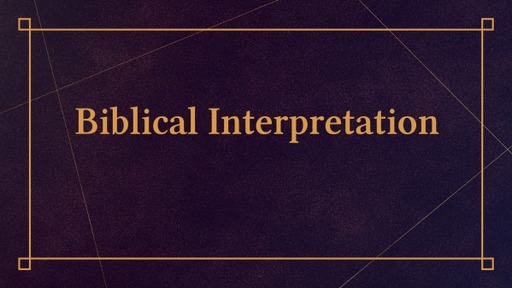Interpretation

We Are All Interpreters
The Bible is relevant to all
Because the Bible is God’s Word, it has eternal relevance; it speaks to all humankind, in every age and in every culture. Because it is God’s Word, we must listen—and obey. But because God chose to speak his Word through human words in history, every book in the Bible also has historical particularity; each document is conditioned by the language, time, and culture in which it was originally written (and in some cases also by the oral history it had before it was written down). Interpretation of the Bible is demanded by the “tension” that exists between its eternal relevance and its historical particularity.
Exegesis
The first task of the interpreter is called exegesis. Exegesis is the careful, systematic study of the Scripture to discover the original, intended meaning. This is basically a historical task. It is the attempt to hear the Word as the original recipients were to have heard it, to find out what was the original intent of the words of the Bible. This is the task that often calls for the help of the “expert,” a person trained to know well the language and circumstances of a text in its original setting. But one does not have to be an expert to do good exegesis.
In fact, everyone is an exegete of sorts. The only real question is whether you will be a good one. How many times, for example, have you heard or said, “What Jesus meant by that was …” or, “Back in those days, they used to …”? These are exegetical expressions. Most often they are employed to explain the differences between “them” and “us”—why we do not build parapets around our houses, for example—or to give a reason for our using a text in a new or different way—why handshaking has often taken the place of the “holy kiss.” Even when such ideas are not articulated, they are in fact practiced all the time in a kind of common-sense way.
Historical Context
1. It simply makes a difference in understanding to know the personal background of Amos, Hosea, or Isaiah, or that Haggai prophesied after the exile, or to know the messianic expectations of Israel when John the Baptist and Jesus appeared on the scene, or to understand the differences between the cities of Corinth and Philippi and how these differences affected the churches in each. One’s reading of Jesus’ parables is greatly enhanced by knowing something about the customs of Jesus’ day. Surely it makes a difference in understanding to know that the denarius (“penny” KJV!) offered to the workers in Matthew 20:1–16 was the equivalent of a full day’s wage. Even matters of topography are important. Those raised in the American West—or East for that matter—must be careful not to think of “the mountains [that] surround Jerusalem” (Ps 125:2) in terms of their own experience of mountains!
Occasion and Purpose
2. The more important question of historical context, however, has to do with the occasion and purpose of each biblical book and/or its various parts. Here one wants to have an idea of what was going on in Israel or the church that called forth such a document, or what the situation of the author was that caused him to speak or write. Again, this will vary from book to book, and it is somewhat less crucial for Proverbs, for example, than for 1 Corinthians.
The answer to this question is usually to be found—when it can be found—within the book itself. But you need to learn to read with your eyes open for such matters. If you want to corroborate your own findings on these questions, you might consult your Bible dictionary again or the introduction to a good commentary on the book (see the appendix on p. 265). But make your own observations first!
Literary Context
This is what most people mean when they talk about reading something in its context. Indeed this is the crucial task in exegesis, and fortunately it is something you can learn to do well without necessarily having to consult the “experts.” Essentially, literary context means first that words only have meaning in sentences, and second that biblical sentences for the most part only have clear meaning in relation to preceding and succeeding sentences.
The most important contextual question you will ever ask—and it must be asked over and over of every sentence and every paragraph—is, “What’s the point?” We must try to trace the author’s train of thought. What is the author saying, and why does he or she say it right here? Having made that point, what is he or she saying next, and why?
Author’s Content
The second major category of questions you need to ask of any text relates to the author’s actual content. “Content” has to do with the meanings of words, the grammatical relationships in sentences, and the choice of the original text where the manuscripts (handwritten copies) differ from one another (see next chapter). It also includes a number of the items mentioned above under “historical context,” for example, the meaning of denarius, or a Sabbath day’s journey, or “high places,” etc.
Hermeneutics
Although the word “hermeneutics” ordinarily covers the whole field of interpretation, including exegesis, it is also used in the narrower sense of seeking the contemporary relevance of ancient texts.
